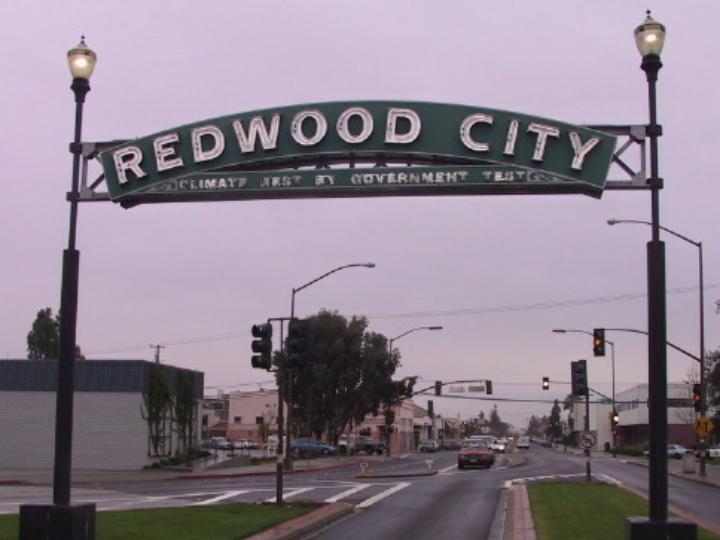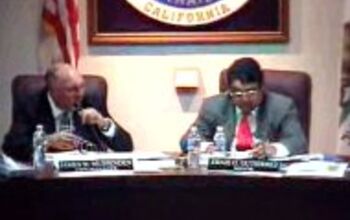California: Another City Admits Accidents Not Reduced By Red Light Cameras
Under court order, Redwood City, California was forced to admit that the red light camera installed at Whipple Avenue and Veterans Boulevard in March 2008 have done absolutely nothing to reduce traffic collisions. San Mateo County Superior Court Judge Clifford V. Cretan instructed the city council to respond to a civil grand jury report from June that blasted municipal programs throughout the county that raised $13.8 million from ticketing despite the lack of evidence of any safety benefit ( read report).
The Redwood City Council will vote Monday to approve a draft response created in close consultation with Redflex Traffic Systems, the Australian company in charge of the Redwood City program. Under the signature of Police Chief Louis A. Cobarruviaz, the letter ignores every substantial recommendation offered by the grand jury. For example, because the number of accidents is not going down, the city disagreed with the grand jury recommendation that the city measure the program’s ongoing effectiveness by the number of collisions before and after camera installation. The grand jury insisted that the city council be provided a regular update on these rates on at least an annual basis, but no such report has been implemented.
“While the number of red light violation-related collisions at the approaches have not had a significant change since the installation of the red light cameras, it would appear the city’s camera systems are reducing the number of red light violations as the number of violations recorded have dropped since their installation,” the draft response letter stated.
The number of violations recorded also decreases as motorists avoid intersections known to have red light cameras. Equipment malfunctions, repairs and vandalism can also reduce the number of violations recorded. The city also blasted the grand jury for implying that the program appeared more concerned with revenue than accident reduction.
“The current revenue realized by the city is surprisingly low compared to expected projections,” the draft response stated.
The city claimed it “had significant difficulty obtaining its portion of the fines from San Mateo County,” which collected $1.7 million in 2008 and $3.2 million in 2009. Redwood City routinely assigned employees involved in other tasks to the red light camera program account to inflate the estimates of the program “cost” — even though the full cost of the program by contract is borne by Redflex. The city also rejected the grand jury finding that it was imposing $446 tickets on minor “California roll” stops at intersections that have little impact on safety.
“The city is unaware of the number of violations for failure to stop before making a right turn in other cities; however, a significant portion of citations issued from the city’s red light cameras are for that violation,” the draft response stated.
To prevent motorists from being unknowingly trapped by such tickets at the enforced intersections, the grand jury recommended signage at each location so that motorists would know right-hand turns would be ticketed. The city has absolutely no interest in providing such warning.
“The city does not have signage at each intersection because it is not required by statute,” the response stated.
Response to San Mateo County Civil Grand Jury Repor (Redwood City, California, 8/21/2010)
[Courtesy: Thenewspaper.com]
More by The Newspaper
Latest Car Reviews
Read moreLatest Product Reviews
Read moreRecent Comments
- FreedMike I'd say that question is up to the southern auto workers. If I were in their shoes, I probably wouldn't if the wages/benefits were at at some kind of parity with unionized shops. But let's be clear here: the only thing keeping those wages/benefits at par IS the threat of unionization.
- 1995 SC So if they vote it down, the UAW gets to keep trying. Is there a means for a UAW factory to decide they no longer wish to be represented and vote the union out?
- Lorenzo The Longshoreman/philosopher Eri Hoffer postulated "Every great cause begins as a movement, becomes a business, and ends up as a racket." That pretty much describes the progression of the United Auto Workers since World War II, so if THEY are the union, the answer is 'no'.
- Redapple2 I think I ve been in 100 plants. ~ 20 in Mexico. ~10 Europe. Balance usa. About 1/2 nonunion. I supervised UAW skilled trades guys at GM Powertrain for 6 years. I know the answer.PS- you do know GM products - sales weighted - average about 40% USA-Canada Content.
- Jrhurren Unions and ownership need to work towards the common good together. Shawn Fain is a clown who would love to drive the companies out of business (or offshored) just to claim victory.


































Comments
Join the conversation
Not everybody is as blithely unconcerned as you about the problems with traffic camera enforcement. Giving the enforcement agency a financial stake in violations being commited. Perversion of safety regulation into a arbitratary taxation system. Manipulation of the installed infrastructure to induce and provoke violations in order to amximize revenue generation. You know: good old fashioned local jurisdiction corruption. This is the same city which stole an entire block of downtown properties from their rightful owners, in oder to hand them over to a developer who promised increased sales tax revenues. Your experiencial anecdote about the effectiveness is belied by every actual scientific study done on them. In short, they don't work. Not if "work" is defined as "reduce accidents" or "reduce violations".
I agree with Steve. I am very glad that TTAC provides the coverage it does on this subject because IMHO it is one of the most important issues of the 21st century. Automated fees for breaking "rules" in the name of public service. I cannot wait for the auto-ticketing for cursing from Demolition Man. Don't get me wrong- I don't blame the politicians. We've created a system where it is political suicide to propose tax increases, even when they are merited.